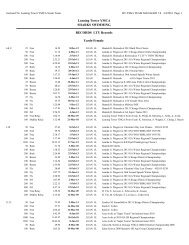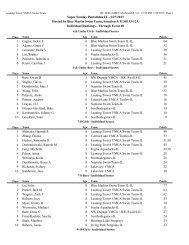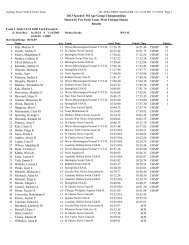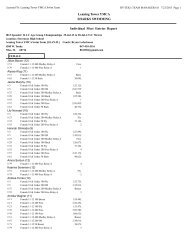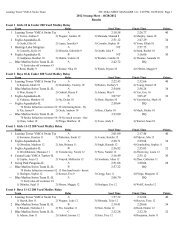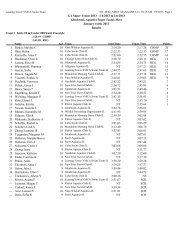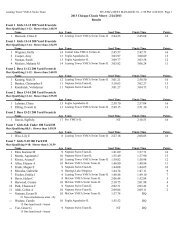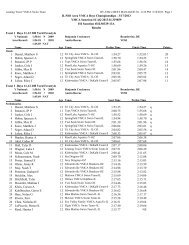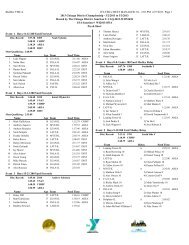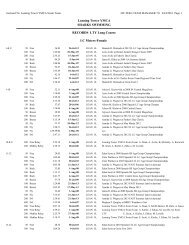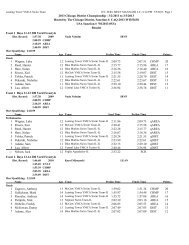leaning tower ymca sharks swim team-parent ... - Sharks Swimming
leaning tower ymca sharks swim team-parent ... - Sharks Swimming
leaning tower ymca sharks swim team-parent ... - Sharks Swimming
You also want an ePaper? Increase the reach of your titles
YUMPU automatically turns print PDFs into web optimized ePapers that Google loves.
RECOVERY: CRUCIAL TO FUTURE PERFORMANCE<br />
Generally, <strong>swim</strong>mers and coaches have not considered post-event nutrition as important as preevent<br />
eating or nutrition during the event. Following the completion of hard training or<br />
competition, it may take up to 24 hours to resynthesize muscle glycogen provided ample<br />
carbohydrate is consumed.<br />
RECOVERY: CRUCIAL TO FUTURE PERFORMANCE continued<br />
As we have seen there may be times when you will train or compete several times a day, like<br />
during our Championship Meets, so it is important to rebuild muscle and liver glycogen stores as<br />
quickly as possible. Because stores of glycogen are essential for maximum performance, you may<br />
need to regenerate these energy stores as rapidly as possible, such as between prelims and finals.<br />
Research has repeatedly shown that when no carbohydrate is consumed after exercise, very little<br />
glycogen synthesis occurs over the next 24 hours. So, eat carbohydrate as soon as possible after<br />
exercise. This is especially true during the championship season, when we are competing more<br />
than once a day. After completing preliminary events, there is a 90-minute break before finals.<br />
During this period, time is of the essence if you hope to ingest enough carbohydrate to restore<br />
glycogen stores.<br />
Hydration is of extreme importance to <strong>swim</strong>mers and athletes in general. I would expect each<br />
<strong>swim</strong>mer on our <strong>team</strong> to have a water bottle at the end of your lane filled with water or Gatorade.<br />
You should be drinking 7 – 10 oz. every 10 to 15 minutes of exercise. In fact, never pass up a<br />
water fountain during the day without taking a drink. Keeping your body hydrated is an ongoing<br />
process.<br />
As a general rule of thumb here is a recommended <strong>swim</strong>mer’s diet:<br />
60 – 65% Carbohydrates<br />
12 – 15% Protein<br />
20 – 25% Fats<br />
You should consume 3 to 4 grams of carbohydrate for each pound of body weight.<br />
Eat “good quality” carbs. As a society, we are eating way too many simple carbohydrates. They<br />
are concentrated calories. Try to get more complex carbohydrates in your diet, more fruits &<br />
vegetables, and more whole grain cereals and breads for starters. Avoid fast food and eat a salad<br />
every day!<br />
On occasion, <strong>swim</strong>mers may get an upset stomach from drinking Gatorade. Some people are more<br />
sensitive to this type of drink than others. For those <strong>swim</strong>mers, you will just have to stick with<br />
plain old water. But don’t underestimate the benefits of plain water. Water has zero calories and<br />
zero sugar, but a good drink of water can reduce hunger, but you still need to eat! Water helps<br />
your body metabolize stored fats, helps maintain proper muscle tone and helps rid the body of<br />
waste. You can survive about a month without food, but only 5 to 7 days without water.<br />
http://www.LTY<strong>Sharks</strong>.com<br />
LTY.<strong>Sharks</strong>@Comcast.net<br />
LTY Hotline: 847-410-5116 9/18/2007<br />
Page 29



